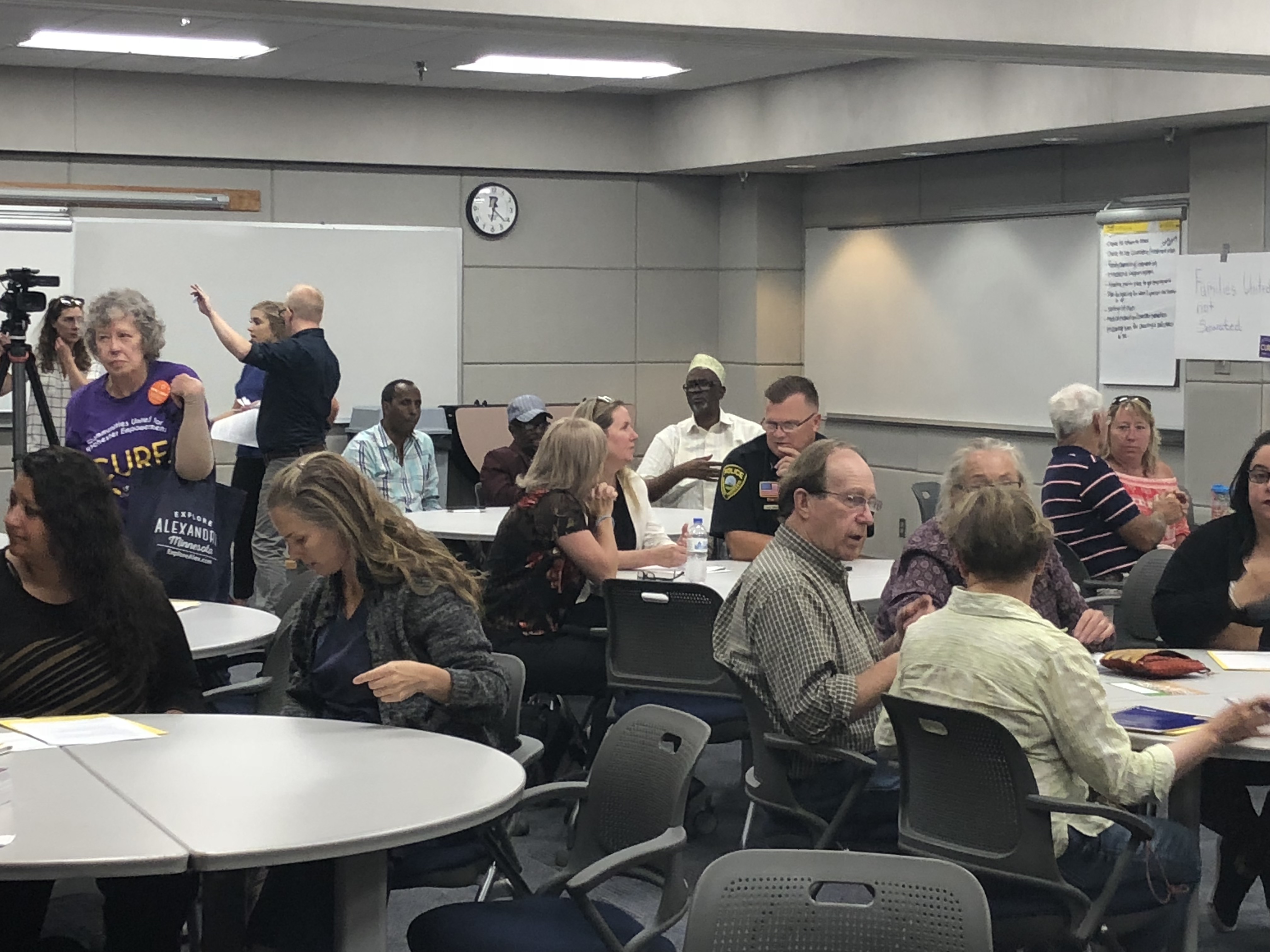

Share
Last week, Communities United for Rochester Empowerment (CURE) hosted a community forum with Olmsted County Sheriff Torgerson and Interim Rochester Police Chief Sherwin to discuss community concerns around immigration enforcement in Rochester and Olmsted County. The event follows local and national rallies where community members questioned how and why law enforcement is working with ICE in separating families.
Che Lopez, lead organizer with CURE, laid the framework for the forum in his opening remarks. “If we are a true city of compassion and Rochester has people from all over the world, we should be welcoming to immigrants,” he said.
Several members of Rochester’s diverse community gave testimony about their experiences. A man identified as Sharif, from the Somali Community, described having a hard time accounting for their community members once they had been deported. For those in the United States, many sponsorships have been suspended. Director of Somali Community Resettlement Services, Sharif Hared, explained that the immigration hurdles that his community faces is an example of, “the real Minnesota nice.”
“So many families are suffering because of deportation or executive order,” Hared said.
Sheriff Kevin Torgerson explained that “we [Olmsted Sheriff’s department] have no interaction with ICE.” However, he also revealed that when an adult is arrested and they mention their country of origin, ICE is called. If ICE expresses an interest, they are called again upon the release of the individual. They are not held in jails to wait to be picked up by ICE.
Mary Eyong was born in South Sudan, but she has been a member of the Minneapolis community for 25 years, where she raised her own children. She drew attention to the six teen suicides that have befallen the South Sudanese community. “They are frustrated by what they are experiencing here,” she said.
Maria Zavala, an RCTC student, explained the anxiety surrounding routine traffic stops. “That’s one of the biggest fears in the Latino community,” she said. “People are scared to drive … because of what we are hearing.”
In response, interim Police Chief Sherwin explained that they don’t ask people about their citizenship. “It makes me sick to think that someone would not attend an event or call the police because of their immigration status,” he said.
In a difficult moment, a member of the crowd talked about Sokchea Voeun a green card holder who was deported to Cambodia despite knowing that he had terminal cancer. Voeun escaped the Khmer Rouge regime and eventually gained refugee status in the United States. The state department is now deporting those refugees convicted of crimes. The Rochester Post Bulletin reports that Voeun has been unable to seek treatment in Cambodia for his stomach cancer and is suffering tremendously
Torgerson explained that he was not familiar with the details, but felt confident that while in the custody of Olmsted County he received excellent care through their private contractor, MEnd Correctional Care. However, MEnd Correctional Care has a documented history of medical neglect.
MEnd Correctional Care
Dr. Todd Leonard’s MEnD Correctional Care has also run into controversy over psychiatric services. MEnd argues that it can provide better services at lower rates. In a June 13, 2017 proposal to Roseau County, MEnd emphasized their use of “mental health telemedicine” as a primary tool for assessment and suicide prevention.
However, a past case in Mille Lacs County Jail questioned the use and efficacy of telemedicine. On Nov. 26, 2013, a $200,000 settlement was approved for the family of Josh Holscher over his death in custody in 2010. According to a Dec. 4, 2013 article in the Mille Lacs Messenger, “Between 2002 and 2010, the jail had two suicides and seven attempts. Five of the inmates who attempted suicide had documented mental illnesses, but only one was placed on a medical hold and evaluated.” The article further explains that the nurse who failed to screen Holscher was a MEnd employee who had been working at the jail.
According to the judge in the Mille Lacs case, it appeared that the suicides were rooted in neglect attributed to health care provider MEnD. The number of suicide attempts and suicides that took place during this period is rare for Minnesota jails, particularly one so small. MEnD’s track record suggests that less is spent on healthcare and is instead focused on increasing profits.
Dr. Leonard has his own history with medical neglect; on May 14, 2011, Leonard was sanctioned by the Minnesota Medical Board. Records indicate that between 2001–2006, Leonard, “prescribed excessive quantities of pain medications to a patient and exhibited unprofessional boundaries.” As the investigation continued, it was also found that,
“Respondent [Leonard] often failed to document a diagnosis, adequate patient history, or a rationale for prescribed medications. On multiple occasions, respondent prescribed controlled substances for his patients but failed to adequately document the specific name of the medication, authorized quantity, or the strength of the medication in the clinic record.”
He was ordered to pay $11,743.30 and participate in a series of reviews and restrictions. His license restrictions were lifted in Aug. 2011, after he completed courses in chronic pain management, records management and professional boundaries.
Tensions Rise
The assembled crowd identified several concerns regarding family members that have been picked up for minor violations and then deported. According to ICE press releases there has been an increase in inland arrests and raids in the Midwest, with some as close to home as neighboring city Albert Lea.Torgerson responded by stating, “I don’t believe that we are instilling fear in the community. False information is instilling that fear.” He asked the assembled crowd to, “stop sharing the fear, please.”
For Che Lopez, the goal overall for CURE is that every member of the community can live with a, “no papers, no fear type of mentality.”

